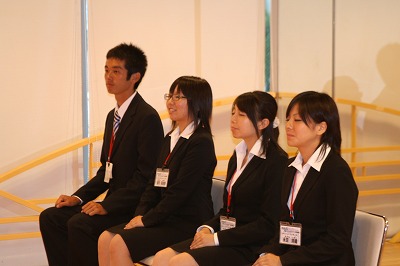As with mostly every company in any country, probably the most important part in the job hunting process is the interview. That does not mean that all interviews are the same, however. Let’s get familiar with Japanese-style job interviews, so that your interviewers will notice your capacity for cultural adaptability and passion for working in Japan.
Contents
Set phrases and behaviors
As with many business practices in Japan, there are a set of conventions for what to say and how to act in an interview. For example, when your name is called to enter the interview room, introduce yourself to your interviewers with a polite bow just after entering the room. Make sure you add a “yoroshiku-onegai-shimasu”, which roughly means “pleased to meet you” in English, to get your interview off to a good start.
In the room, you don’t want to take a seat until the interviewer tells you to do so. Sit up straight when you are seated; crossing your legs is out of the question. Men can make fists and put them in your lap, but be careful not to hold your hands so tight that you look too tense. For women, put your legs together and place your hands on your lap with one hand gently crossed over the other. Practice until you feel comfortable to keep a good posture throughout the whole interview to seem alert and enthusiastic, but still natural and relaxed.

The interview room
At interviews in some foreign companies, there may be a desk and chair prepared for interview sessions. But in most cases at Japanese companies, there is only a chair placed in the middle of the room with the interviewer(s) sitting at a table on the far end. Your chair could be quite far from the table, so you need to speak up to be heard. You will most likely feel a bit exposed sitting isolated, like you are being watched from every angle; just mentally prepare for this case in advance so it doesn’t throw you off.

You might feel a little like you are sitting here… don’t let it make you nervous!
Interview questions just for non-Japanese
In Japan, you will of course be asked standard questions such as your strengths and weaknesses, what has motivated you to apply to that company, and about your special skills and capabilities. But as a non-Japanese, the interviewers will be interested to know other things about you as well.
The biggest question the interviewers want to ask you is “why do you want to work in Japan?” Basically, they are looking forward to the answer “I love Japan” in some form or another. Tell them which aspects of Japan you like so they know that you will stay in Japan for a decent amount of time and enjoy living here. Even if your real answer to the question lies in salary, try talking about other more positive reasons instead.
Expect to be asked about cultural differences between your country and Japan. You could tell an interesting anecdote that shows your understanding and adaptability to Japanese culture. They may ask you some questions about knowledge on the Japanese language or manners and customs in Japanese business, too.
Other things they might ask about are if you have plans to go back home in the future, if you intend to be naturalized in Japan, or what your family thinks of you working in Japan. They could ask if you have a good command of English or other languages, and if you would be willing to do translation or proof-reading tasks in addition to your regular work.
Written tests
Some Japanese companies place more weight on applicants’ character and personality than on their academic abilities and skills. While talking with a candidate face-to-face allows an interviewer to see to some extent what that person is like, it is much too difficult to get to know someone well in that short time. To gauge such essential aspects of ‘you’ they often give written tests to applicants, either before or after the first interview.
The written tests are called SPI tests (適性検査, tekisei kensa). Some are handwritten, but more often they are given online, so you can take the test from home. Not every company is able to offer the test in multiple languages, so in that case you will need to rely on your Japanese reading skills.
Other types other tests or tasks you might encounter will measure your math skills, coding ability, reading comprehension, or even your passion to enter that particular company.
Group interviews
The classic one-on-one (or one-on-many) interview still prevails, but the group discussion style of interview has also become popular. Seeing free and interactive conversation among a group of applicants, recruiters can check their capacity for leadership, critical thinking, and communication. Japanese people may tend to defer to others who are higher in status or to avoid a dispute, so you could shine in this situation if you have had lots of discussion practice at school in your country,
To sum up
Now that you have a better idea of different styles of interviews in Japan, you should be ready to perform in whichever interview situation you face. I hope this will free up space in your head to focus on the substance of your answers to the interview questions. Answer clearly and thoroughly with a smile, and surely you will do well!
By Onomatopoeia
An instructor English conversation school.
A certified guide-interpreter of English.
A working mother of two children.
?Read more TalentHub blogs: https://talenthub.jp/blog/?lang=en









